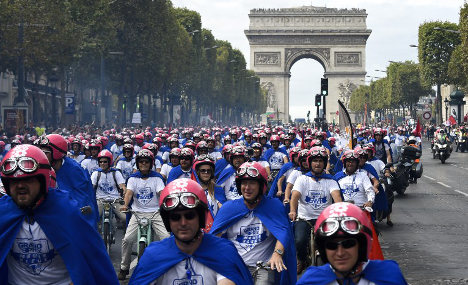Decked out in matching blue capes and pink helmets, the bosses zipped down the boulevard on their Motobecane mopeds, much beloved in France during the 1970s.
Organisers said the event was an “apolitical” attempt to boost confidence in the French economy — which is expanding, though barely — and show solidarity with employees.

“It's an anti-crisis, anti-gloom message,” organiser Dominique Ravon told AFP. “The goal is for entrepreneurs and their employees to come and show that everything is alright.”
Remi Peraud, a bank manager with the Banque Populaire who took part in the two-wheeled demo, said he wanted to show that “bosses know how to have fun”.
The event was also designed to allow business chiefs to discuss new potential collaborations, organisers said in a statement.
The corporate bikers also included executives from Brazil, Canada and Spain.
The “Meules Bleues” (Blue Moped) event is now in its third year, having started out with 150 bosses taking part in 2014.
France's economy grew 0.7 percent in the first quarter but fell back to zero growth in the second, according to EU statistics agency Eurostat.
But in a glimmer of brighter news, unemployment dropped below 10 percent for the first time since 2012 last quarter, at 9.6 percent.



 Please whitelist us to continue reading.
Please whitelist us to continue reading.
Member comments